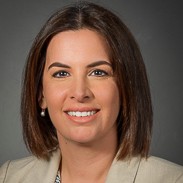 By Priscila Gonçalves, MD
By Priscila Gonçalves, MD
Since my diagnosis of early-stage breast cancer, I was initially very hesitant on sharing with others outside my close personal circle. I would go back and forth between, “Let’s pretend nothing is happening and get on with life,” with moments of, “Poor me,” as well as, “I should tell everyone, as this can happen to anyone,” along with, “I am an oncologist, I should be taking care of patients with cancer—I don’t want to be on the other side,” and finally, “I feel like I don’t belong to the ‘Healthy People’ group anymore,” along with several other thoughts that sometimes could not be so easily formulated due to the emotional turmoil inside my head and heart.
So, what is the protocol on such things? Being a phase I cancer researcher, scientist, physician, mom, doctor, type A, micromanager, multitasker, and perfectionist (you get the gist), I wanted to follow the protocol, do what is right, and fix it fast. Well, as I found out, the truth is that there is no protocol. It is whatever feels right to you. And for me, I first started having a glimpse of what that was right after I woke up from surgery.
As soon as I gained consciousness, still in a propofol daze, I saw the smiling face of the medical assistant looking straight at me, just like in the movies. And all I could think of, as he kept looking at me and smiling, was the word kindness. I still could not speak and my eyes were killing me (side note: got bilateral corneal ulcers from not having my eyes closed properly by the anesthesiologist, boo!), but I felt immersed in such an overwhelming sense of comfort and love that I kept smiling back at him. And I felt so grateful for that.
As the usual rigmarole of medical consults and procedures in such situations unfolded, I continued to feel grateful for all the kindness I encountered. Grateful for the friend who, since day one, daily texts me a single emoji to brighten my day; for all the flowers and “I Love You” cards I received; for my sister, who left her family and work in Brazil and spent several days with me on a very short notice; for my husband, who helped me on the post-surgical days when I was a true ECOG PS of 4, and held the fort at home; for my son, who tried so hard not to be a preteen with me; for my daughter, who helped me pick my wig and found it to be the best and funniest experience ever; for my colleagues at work, who covered me without a moment of hesitation; for my friends, who offered to drive my kids to soccer and gym; for my mom, who came from Brazil twice in less than 3 months; for friends and family, who offered all kinds of well-meaning (awkward or not) pieces of advice; for friends who understood and respected when I wanted and did not want to talk about it; for the strangers who smiled at me; for my medical team who answered my texts and questions, and were always accommodating to help with my crazy schedule; for the friend who, when I came over, had hundreds of pillows on a bed so I could sleep in a comfortable nest after my surgery; for my oncology friends and my Wolf Pack Facebook group who listened to my story, answered my questions, and had messages of encouragement and support; for the friend who listened to my swearing and joined me in cursing all of this; for some of my patients, who noticed my lack of eyebrows and sent delightful get well notes; and the list goes on and on.
I am sure that most of us, if we took the time, could write a similar gratitude list. But the real gift is taking the time to appreciate it, and that is what (as cliché as it sounds) dealing with my own diagnosis is teaching me. No, I am not perfect. I have my moments, trust me (or ask my husband). But, if I can learn anything from this experience, it will be to continue to appreciate and reciprocate kindness with kindness.
As women oncologists, I know we take really good care of our patients, and I am sure, just like me, you had several of your patients thank you throughout the years. That warm feeling of being appreciated and helping others is one of the reasons I chose oncology to start with. But what I had not realized until now is how powerful being thankful and being helped also feels. I hope this experience changes me from the inside as much as it has changed me on the outside. So this is my “protocol for such things”: being grateful and appreciating the kindness surrounding me. That is what is keeping me going.
Dr. Gonçalves is the associate director of the Center for Novel Cancer Therapies (CNCT) and an assistant professor at the Zucker School of Medicine at Hofstra/Northwell. In addition to developing and conducting early-phase trials for all solid tumor types, Dr. Gonçalves specializes in head and neck cancers, salivary gland tumors (with a research focus in adenoid cystic carcinoma), non-melanoma skin cancers, and virally associated tumors, including tumors caused by HPV, EBV and KSHV. Her professional interests include mentorship and teaching, in particular advancing women in science and oncology. She is a 2005 recipient of ASCO’s International Development and Education Award (IDEA) and a current member of ASCO’s Cancer Research Committee.

Comments
Anthony Perre
Nov, 07 2019 9:57 AM
Fantastic perspective! As a cancer survivor myself I can also say that despite our MD degree, we are still faced with the same fears and uncertainties that our patients endure. Thank you for this article !